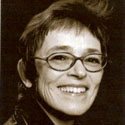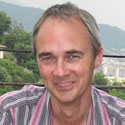Academic Editors
The following people constitute the Editorial Board of Academic Editors for PeerJ. These active academics are the Editors who seek peer reviewers, evaluate their responses, and make editorial decisions on each submission to the journal. Learn more about becoming an Editor.

Giorgio Vacchiano
MA and PhD in forestry at University of Turin. Assistant professor in forest management and planning at University of Milan

Tiziana Vaisitti
Dr. Vaisitti has been working in the field of CLL since she started her PhD program studying the role of CD38 in the biology and pathogenesis of CLL. She continued the training in hematology/oncology obtaining a 3-year fellowship from the Italian Association for Cancer Research (AIRC), with a project aimed at analysing and dissecting the molecular mechanisms regulating leukemic proliferation and homing. Dr. Vaisitti spent several periods in Italian and foreign laboratories as a visiting scientist including a period at Feinstein Institute for Medical Research, North Shore-Long Island Jewish (NY) and a period at the Dept. of Medical Biochemistry and Immunology, Cardiff University (UK). Recently, Dr. Vaisitti spent 2 years as a visiting fellow at the Weill Cornell Medical College, Dept. of Pathology and Laboratory Medicine (NY), to set up patient-derived xenograft models of CLL and Richter syndrome, and also investigate the functional impact of novel drugs.
In the last 5 years, Dr. Vaisitti’s research has been focused on two main topics. The first one is the functional analysis of genes found recurrently mutated in chronic lymphoproliferative syndromes. Attention has been focused on NOTCH1, SF3B1, BIRC3 and NOTCH2. These works were done in a joint collaboration with the group of Prof. Gaidano (University of Eastern Piedmont, Italy). The second topic is the discovery and analysis of host microenvironmental conditions that favor leukemic development and progression.

Alfonso Valencia
Bioinformatician. Interested in biological networks, cancer biology, text mining, and personalised medicine.
ICREA professor. Director of the Life Sciences Department at Barcelona Supercomputing Center. Director of the Spanish Bioinformatics Institute (INB / ELIXIR-ES) and Executive Editor of Bioinformatics. Elected Fellow and President of the International Society for Comptuational Biology (ISCB). Member of EMBO.

Lil E. Valentin
Professor of Obstetrics and Gynecology, Lund University, Sweden. Fellow ad eundum of the Royal Society of Obstetricians and Gynecologists (UK). Former editor of Ultrasound in Obstetrics and Gynecology. Former chairman and secretary of the Swedish society of medical ultrasound. Member of European Committee for Medical Ultrasound Safety, member of Clinical Standards Committe of International Society of Ultrasound in Obstetrics and Gynecology.

Giorgio Vallortigara
Giorgio Vallortigara is Professor of Professor of Cognitive Neuroscience and Director of the Centre for Mind/Brain Sciences at the University of Trento, Italy, and he has been an Adjunct Professor at the School of Biological, Biomedical and Molecular Sciences at the University of New England, Australia.
He is the author of over 250 scientific papers (with more than 11900 citations overall; h-index: 53 Scopus; 62 Google Scholar), most in the area of animal cognition and comparative neuroscience. He discovered the first evidence of functional brain asymmetry in the so-called “lower” vertebrate species (fish, amphibians); he also worked on comparative cognition, in particular on visual perception of biological motion, and spatial and number cognition. He served in the editorial boards of several cognitive science and neuroscience journals, he is co-editor of the journal “Laterality: Asymmetries of Brain, Body and Cognition” and has been the recipient of several awards.
His major research interest is the study of cognition in a comparative and evolutionary perspective, with particular reference to the mechanisms underlying the use of geometry in spatial navigation and the origins of number and object cognition in the animal brain. He also studied extensively the evolution of the asymmetry of the brain.

Jana Vamosi
I am a biodiversity scientist examining the macroevolution, macroecology, community ecology, and conservation biology of plants. I often incorporate phylogenetic approaches to questions pertaining to the evolutionary ecology of plant-insect interactions.

Yves Van de Peer
Professor of Bioinformatics and Genome Biology at the Department of Plant Biotechnology and Bioinformatics, Ghent University. Part time professor at the University of Pretoria. Part time professor at Nanjing Agricultural University. Associate editor of, amongst others, The Plant Journal, BMC Bioinformatics, Advances in Bioinformatics, Genome Biology and Evolution, Journal of Molecular Evolution, Molecular Genetics and Genomics, and PeerJ.

Antonie J (Ton) van den Bogert
Antonie (Ton) van den Bogert is Professor of Mechanical Engineering and the Parker-Hannifin Endowed Chair in Human Motion and Control. His current research interests are the dynamics and control of human motion, with applications in sports and rehabilitation.

Francois H van der Westhuizen
Francois van der Westhuizen is currently a Professor of Biochemistry and Deputy Dean (Research and Innovation), Faculty of Natural and Agricultural Sciences North-West University, Potchefstroom, South Africa. He received his PhD (1998) at this institution, with post-doctoral and sabbatical research experiences at Nijmegen Centre for Mitochondrial Disorders, Radboud University Nijmegen Medical Center, and the Mitochondrial Research Group, Newcastle University, respectively. His research focusses on the etiology of mitochondrial disease in the South African population; cell biological responses (transcriptomics and metabolomics) in mitochondrial disease models; and the involvement of mitochondrial bioenergetics and mtDNA genetics in non-communicable diseases.

Jaap H van Dieën
Jaap van Dieën worked as a researcher in physical ergonomics at the Institute for Agricultural Engineering in Wageningen, the Netherlands (1986 to 1996). He obtained a PhD from the Faculty of Human Movement Sciences at the VU University Amsterdam the Netherlands in 1993 and has been affiliated to this faculty since 1996. In 2002, he was appointed as full professor and became head of the department in 2016. Jaap van Dieën leads a research group focusing on the neuromechanics of human movement, with applications in ageing, musculoskeletal and movement disorders and sports. His research focuses on four themes:
1) Balance control: what determines good balance control, how we can assess balance control and fall risk, and how can balance control be improved?
2) Control of trunk posture and movement: how does trunk control change with disorders like low-back pain, and how can changes in trunk control be assessed clinically?
3) Spine mechanics and low-back pain: how can low-back loading be assessed, and how effective are ergonomic interventions in reducing low-back loading?
4) Measurement tools for biomechanical and neurophysiological assessment with a focus on applications outside the lab.
Jaap van Dieën has supervised over 50 PhD students and (co-) authored over 500 papers in international scientific journals. He is currently the editor of the Biomechanics and Control of Human Movement section of Frontiers in Sports and Active Living and serves on several editorial boards.

Walter M. van Gulik
Assistant Professor, Department of Biotechnology, Delft University of Technology, Delft, The Netherlands.
Our research is focused on obtaining a quantitative understanding of the functioning of industrial microorganisms under the harsh dynamic conditions of the large scale industrial bioreactor. To achieve this we apply both computational and experimental tools.
My group has obtained an excellent reputation within the field of metabolic systems engineering in the international scientific community, combining both theory and experimentation. Especially with respect to quantitative metabolomics and the development of experimental and theoretical tools for the unravelling of in-vivo metabolic regulation of microbial cells.

Yolanda van Heezik
Professor in the Zoology Department at the University of Otago, Dunedin, New Zealand, with an interest in urban ecology. Worked as a wildlife biologist in the Middle East and Southern Africa.

